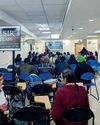
Imagine learning the principles of management from the fallen heroes in William Shakespeare's plays, or the nuances of governance and politics through war poetry. Such adventures in learning are being made possible by liberal arts education, an approach to higher education that emphasises the interconnectedness of disciplines rather than their differences.
Unlike the rigid traditional programmes offered in India's conventional universities, liberal arts institutions are attracting students by offering choices, a shift away from rote learning and versatile skills that fit diverse careers.
Most universities offer three-year undergraduate courses with a few exceptions that include a fourth year dedicated to research and thesis-writing. Instead of a pre-defined career path, the liberal arts programmes aim to solidify foundational learning before pursuing specialisations. The National Education Policy (NEP) 2020 also insists on higher education institutes becoming multidisciplinary by 2040.
A liberal arts programme also allows for the exploration of new and untrodden career paths. With a liberal arts degree, students can branch into a wide array of career options such as journalism, public relations, writing, law, politics, linguistics, publishing, social work, psychology, management, public policy, civil services, marketing and more.
Since this form of education emphasises discussions and the exchange of ideas, classes tend to be experiential, interactive. The programme cultivates critical thinking and creative problem-solving along the way.
No rigid barriers
Breaking the rigid barriers between professional and liberal education is one of the main agendas of these institutions. A discipline is not viewed from a single perspective.
This story is from the {{IssueName}} edition of {{MagazineName}}.
Start your 7-day Magzter GOLD free trial to access thousands of curated premium stories, and 9,000+ magazines and newspapers.
Already a subscriber ? Sign In
This story is from the {{IssueName}} edition of {{MagazineName}}.
Start your 7-day Magzter GOLD free trial to access thousands of curated premium stories, and 9,000+ magazines and newspapers.
Already a subscriber? Sign In

Sleeper Cells: Law schools' 'dormant' legal aid clinics
A law college survey by the Supreme Court's policy centre found that a worrying number of legal aid clinics do little more than hold legal awareness camps, despite NALSA, BCI rules. This leaves gaps in legal education

Law's new niche frontiers
How niche law programmes are blending science with legal expertise, transforming legal education and creating specialised career paths

'GP Sir's classes' a ray of hope for the poor
Shrishti (name changed), 31, hails from the Valmiki community based in Gurdaspur, Punjab; she was born into a family of safai karamcharis - cleaners and at 21, married into another.

DU Law Faculty is part of CLAT 2025 but plans own exam: Dean
Delhi University's Faculty of Law will admit to its BBA LLB and BA LLB courses through the CLAT exam this year.

Studying law through films, novels, comics
Law schools are using various art forms - films, comics, theatre, puppetry

Legal education meets AI
As artificial intelligence reshapes industries, India’s leading law schools are introducing specialised courses and research initiatives, often in collaboration with technical institutions. But the need for comprehensive regulations persists

A LEGACY IN CRISIS
Asia's oldest law college and alma mater to legal luminaries, Government Law College, Mumbai, now grapples with declining standards, administrative apathy, and students' shifting educational aspirations

Law Colleges for 2025
Careers360 has ranked 100 law colleges and rated over 185 institutions, categorising them into distinct zones and states, for a comprehensive overview of legal education

IIT Madras introduces another quota
After admitting five students via the sports quota in 2024-25 - a first among the IITs Indian Institute of Technology Madras has now introduced another quota for \"fine arts and culture excellence\".

CLAT answer keys and court cases
Many Common Law Admission Test (CLAT) candidates claimed to find mistakes in its provisional and final answer keys.